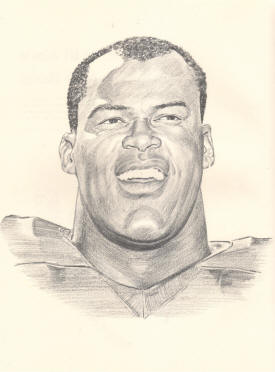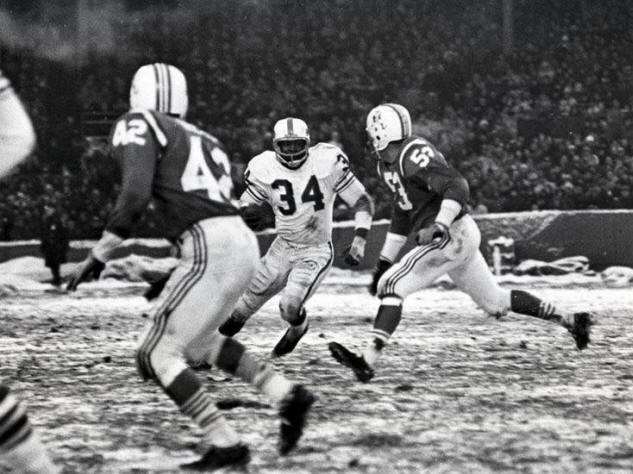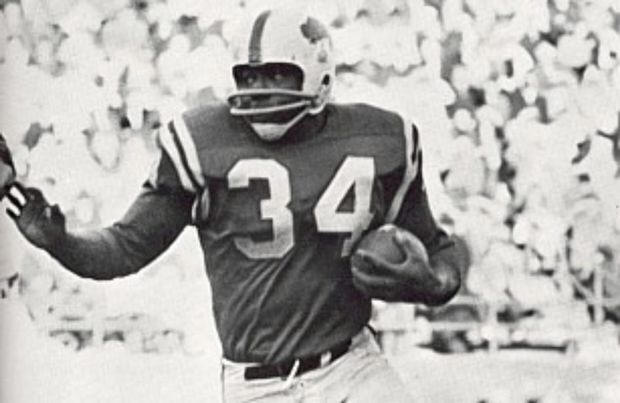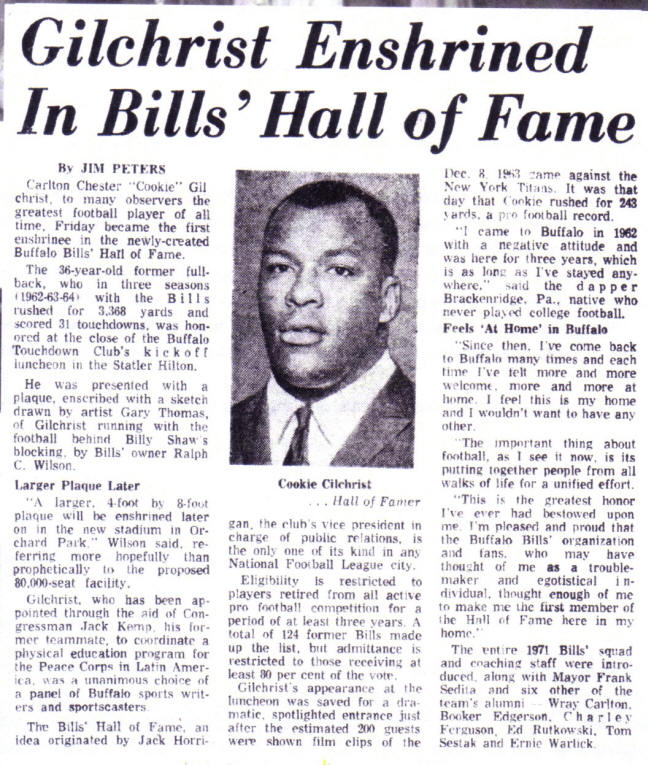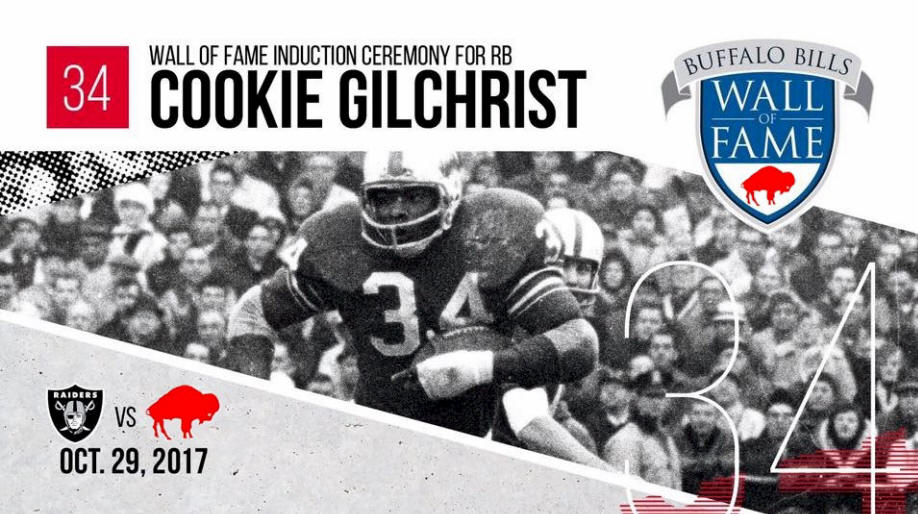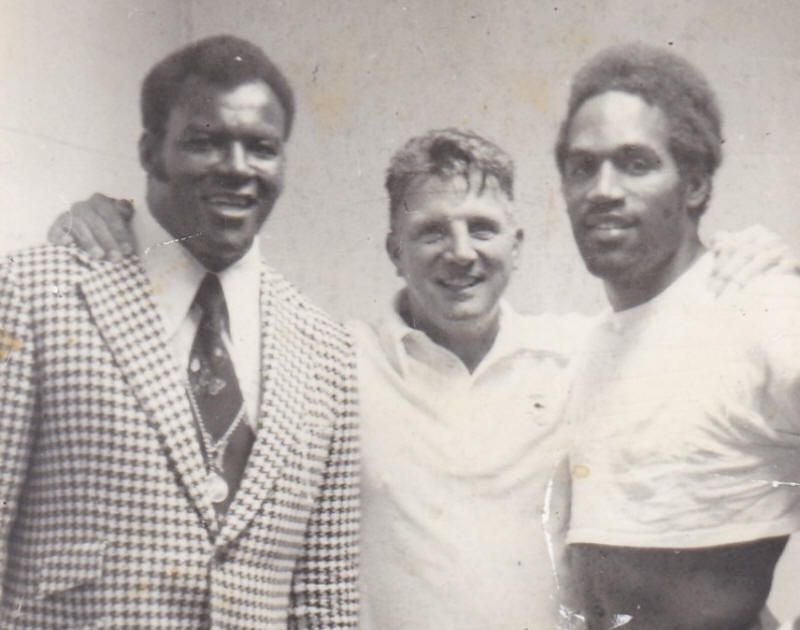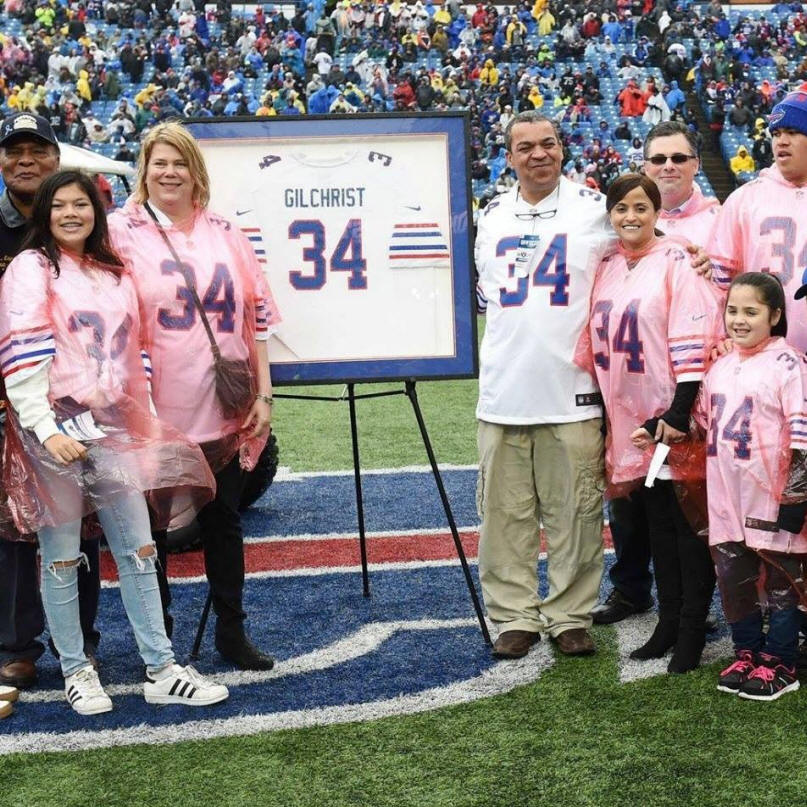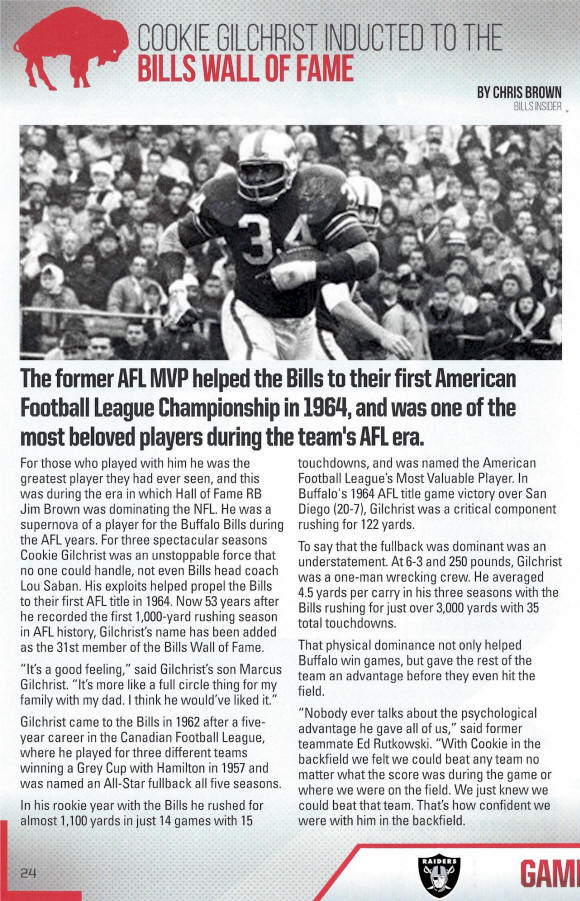|
|
|||||
|
|
|
|
|
||
| . | |||||
| . |
|
Carlton Chester 'Cookie' Gilchrist |
| . |
| . |
|
. |
|
|
. |
|
| . |
|
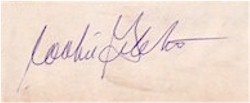
. |
|
. |
|
THE
BUFFALO
NEWS |
||||
|
|
||||
| No athlete in Buffalo history ever had such a
short-lived run in Western New York while making such a big impact on
the community's sporting consciousness as Cookie Gilchrist. Gilchrist, a man who ran like a freight train on the field and was larger than life off it, died early Monday of cancer in an assisted-living facility near Pittsburgh. He was 75. Gilchrist was the first superstar of the Buffalo Bills. His tenure lasted only from 1962 to 1964, but his exploits in helping the Bills to their first American Football League championship helped ingrain the Bills as part of the fabric of the society. "Of all the football players I've seen over my years, he'd be in the
top five, there's no question about that," said Joe Collier, a former
Bills head coach and one of the most respected defensive minds in
football." |
|
|||
|
Cookie Gilchrist, to my way
of thinking, was one of the
greatest professional
football players who have
ever played the game, either
NFL or AFL," said the late
Jack Kemp, in an interview
with The Buffalo News in
2002. "If he had played his whole career in the NFL, absolutely, he'd have been a Hall of Famer, no doubt about it," said former Bills tight end Ernie Warlick. Gilchrist came to Buffalo as a 27-year-old "rookie" in '62 after spending the previous six seasons in the Canadian Football League. Over the next three seasons he combined for 3,931 yards rushing and receiving and scored 35 touchdowns. He set a single-game pro football rushing record with 243 yards in a 1963 game against the New York Jets at War Memorial Stadium. He rushed for 122 yards in the Bills' 20-7 victory over the San Diego Chargers for the AFL championship in 1964. At 6-foot-3 and 251 pounds, Gilchrist was one of the most powerful runners the game had seen, but he also had enough speed to get around the corner against defenses. "There was none any better than Cookie in hitting the hole from tackle to tackle," said Bills Hall of Fame guard Billy Shaw. "He would punish linebackers and defensive linemen. He would hit the blocker in front of him if he didn't get out of the way. I have scars in my back from when someone would stalemate me at the line, and here comes Cookie from behind me. He didn't care what color jersey you had on, he was going forward." Gilchrist was not as fast as Brown, but he was about 15 to 20 pounds heavier. "I don't know if he had the type of quickness Jim Brown had," said Collier from his home in Colorado. "Jim Brown could wiggle in the open field. Cookie was not a wiggle guy. He was a straight-ahead type guy. But in those days he was the perfect guy." Gilchrist's outspoken nature got him embroiled in a controversy in the 1964 season that led to his departure from the Bills. The Bills were riding a nine-game winning streak and playing their arch rivals, the Boston Patriots, in Buffalo. Gilchrist, mad about the Bills' pass-oriented game plan, took himself out of the game late in the first half and refused to go back in. The Bills lost, 36-28. Coach Lou Saban waived Gilchrist two days later. Kemp brokered a reconciliation, and Saban took Gilchrist back after the big fullback apologized on live television. Four weeks later, the Bills played an all-or-nothing regular season finale at Boston. On the first play from scrimmage, Gilchrist set the tone with a 9-yard run off tackle. "We ran a slide play," Bills back Wray Carlton told The News in 1997. "Cookie broke it to the outside, and he ran straight at Patriots cornerback Chuck Shonta. Cookie ran right over him and knocked him out cold. Shonta was laying on the field, and Cookie walked back to the huddle and said to the Patriots standing around him, 'OK, which one of you [so-and-sos] is next?'" The Bills won, 24-14. However, Saban had seen enough of Gilchrist's nonconformist nature and traded him to Denver after the season. Gilchrist played three more seasons before retiring. Gilchrist had a chip on his shoulder his entire adult life over the fact he did not get a fair shake from the football establishment. He was born Chester Carlton Gilchrist, named for a black physician, Dr. Chester Harris. Gilchrist was not sure where his nickname came from but did not mind it because he said "there's never been a bad cookie." Gilchrist was a high school football star at Har-Brack High School in Natrona Heights, Pa., near Pittsburgh. His junior season was his last because he was going to turn 19 before his senior season, too old under the scholastic regulations. Along came Paul Brown, great coach of the Cleveland Browns, who offered Gilchrist $5,500 to try out for the National Football League NFL team. Gilchrist accepted but before he ever collected, the NFL decided it was not going to allow signing of underage players. By Gilchrist's count, more than 100 universities were recruiting him. But even if he had sat out a year before going to college, he would have been ineligible; the colleges decided his pro deal violated his amateur status. Brown sent Gilchrist to play rugby in Canada. Gilchrist played two seasons in the Ontario Rugby Football Union, then jumped to the CFL's Hamilton Tiger-Cats. He tore up the CFL for six seasons, two with Hamilton, one with Saskatchewan and three with the Toronto Argonauts before Bills scout Harvey Johnson lured him to Buffalo. He still holds the Argos' single game record of 27 points. Gilchrist enjoyed his time in Canada, but having to spend some of his best years in obscurity north of the border -- and losing out on NFL salaries -- rankled him. He refused induction into the CFL Hall of Fame due to what he felt was exploitation by league owners. He resisted most offers to return to Buffalo for appearances due to what he felt was unsatisfactory compensation. "He couldn't get that out of his craw," said Bills great Booker Edgerson, a loyal friend of Gilchrist. "He felt if he had been able to go to college he'd have been a better person for it. But he was a bright guy. ... I told him, 'Cookie, you came out on your own because you were ineligible to play [in high school].' He never got over it. He talked about it and talked about it. He didn't take advantage of so many good opportunities he could have had. The people of Buffalo and Western New York loved him." Gilchrist also fought injustice off the field during the '60s. In 1965, he led a group of 21 black players to boycott the AFL All-Star Game, which was to be held in New Orleans. The AFL players encountered segregation at hotels and restaurants upon their arrival in the city. "The next morning," Warlick said, "all of the guys got a call from Cookie saying we were going to have a meeting because we ran into segregation and I think we need to talk about it. All the black players were there, and a couple of white guys attended the meeting. Cookie was the one who spearheaded it. We voted not to play." The game subsequently was moved to Houston, and the embarrassment had at least some impact on changing some segregation practices in New Orleans, which led to the city getting an NFL franchise. Gilchrist overcame throat cancer in 2007, but cancer returned in more aggressive form in September and he had been in the hospital since. Bills owner Ralph C. Wilson Jr. released this statement: "The Bills were very lucky to have procured the services of Cookie Gilchrist who was one of the greatest fullbacks I have ever seen in all of my years in professional football. ... He was the greatest extemporaneous speaker that I have ever heard. At a banquet, he could get up and talk on any subject no matter what it was. "I had the opportunity last week to speak with Cookie by telephone and we had a good conversation. Today is a sad day for me, the Bills and all of the community that Cookie is no longer with us and I want to offer my deepest sympathies to his family and friends." Gilchrist is survived by two sons, Jeffrey and Scott, and a daughter, Christina, all of Toronto. Visitation is Wednesday in Ross G. Walker Funeral Home, New Kensington, Pa. The funeral is Thursday. |
||||
. |
|
THE
BUFFALO
NEWS |
Cookie was outspoken, ahead
of his time
|
| By JERRY
SULLIVAN NEWS SENIOR SPORTS COLUMNIST |
|
January 11, 2011
There are times in this business when you envy
the older guys, when you wish you could look
back fondly to a simpler, earlier time. One of
my few regrets is I never got to see Cookie
Gilchrist play football. From what I'm told, he
was one of those players you had to see up close
to appreciate his rare combination of power,
size and skill.
Larry Felser, who covered the Bills from the start, has called Gilchrist the best player, pound for pound, he ever saw. The late Jack Kemp, who played in the same backfield, said Cookie was a better all-around player than Jim Brown. But it goes beyond Gilchrist's raw athletic ability. Even more so, it would have been a treat to know and interview Cookie back in his playing days, when he was young and defiant, a constant thorn in Ralph Wilson's side. Gilchrist had a personality that was every bit as big as his talent, and a chip on his shoulder that was worthy of his 6-foot-3, 251-pound frame. Gilchrist, who died at age 75 on Monday of cancer, was ahead of his time as a player and a man. He was the progenitor of the big, bruising featured back. In other ways, he was a throwback. During his six years in Canada, Gilchrist played both ways. He kicked and played special teams. He kicked field goals one year for the Bills. Harvey Johnson, who scouted Gilchrist in Canada and later coached the Bills, felt he was better on defense. Cookie thought so, too. In his later years, Gilchrist had his own website, where he would expound on all manner of subjects. Even football: "This iconoclastic football player played every position except quarterback," he wrote. "And he would have done that too, if he could have handed off to himself." That was classic Cookie, no stranger to self-promotion and hyperbole. He would call Wilson late at night to ask for a new contract. He would walk up to the owner and ask for a personal loan. Once, Wilson opened his wallet and pulled out $100. He said that was all he had. Gilchrist turned it down. It was beneath him to accept so piddly a sum. Gilchrist never felt he was paid enough. He was right, of course. This was a time before player unions, when the typical professional athlete had scant leverage with ownership. But Cookie was no typical athlete. In the spring of '64, he wrote a letter to Wilson, coach Lou Saban and the rest of Bills management. It began: "Gentlemen, it unfortunately becomes necessary again for me to formally request that you make efforts to trade me to some other football club." He got a raise. The Bills won their first nine games. In the 10th game against Boston at War Memorial Stadium, the Bills lost a game in which Kemp and Daryle Lamonica combined to throw 53 passes. Gilchrist was so upset with his lack of work, he sent his rookie backup, Willie Ross, into the game without telling Saban. The Bills put Gilchrist on waivers two days later. Gilchrist went to practice that week and apologized to his teammates, many of whom had been furious with his actions. Saban met with Cookie and took him back. He said he did not think Gilchrist was capable of humbling himself that way. Still, the Bills traded Gilchrist to Denver after the season. Gilchrist was a complicated man, a tortured soul. Paul Brown signed him when he was 18 and brought him to the Cleveland Browns' camp. The signing was later deemed illegal by the NFL. Brown pulled back his promise that Gilchrist would make the team. He was no longer eligible to play college ball. So he left for Canada, where he played for eight years before joining the Bills in 1962. Imagine how good Gilchrist must have been for a sainted figure like Brown to attempt to circumvent the rules for him! Evidently, people were trying to take advantage of gifted high school athletes long before Cam Newton and Reggie Bush came along. Gilchrist never got over it. From then on, he was suspicious of the men who ran the sport. "He held that grudge all his life," said Ang Coniglio, the Amherst resident and AFL historian. At the time of that Boston game in '64, Gilchrist was being profiled by a Sports Illustrated piece by Edwin Shrake. It's a fascinating piece of journalism, elevated by Shrake's writing and his subject's rambling, profound and often outrageous comments. "People think I'm an oddball because I'm a Negro who speak up," Gilchrist said in the article. "But I have a lot on my mind. It's an internal disease, and it'll eat me alive if I don't get it out of my system what I think about things." You can go years without hearing such a quote from an athlete these days. Most pro athletes are practiced in the art of saying nothing. They need to watch the film before admitting they made a bad throw. Few of them ever dare express a provocative or political thought. It's bad for business to have real opinions, as any player agent could tell you. Gilchrist was open about the question of race. Remember, this was before the Civil Rights Act was passed in July of 1964. Black athletes were still housed separately from their white teammates in some southern cities. After the '64 season, Gilchrist led a group of 21 black players who boycotted the All-Star Game in New Orleans, because they could not get service or respect in some of that city's establishments. They won. The game was moved to Houston. Gilchrist later said his role in the boycott was "better than anything I did playing football." I spoke with Gilchrist for the first and only time in June 2005. The Bills were celebrating their championship teams. Members of the AFL champions and Super Bowl teams showed up. Cookie, as usual, did not. He wanted a special appearance fee. By then, the Bills had stopped asking, because the answer was always the same. "I played football for one reason," he told me. "To get paid. I didn't get paid what I was worth when I played for the Buffalo Bills. It's impossible for you to even comprehend the full magnitude of my contribution, not only to the Bills or Toronto Argonauts, but the economy of America." Gilchrist then launched into a 15-minute rant on slavery, the Bible, racism, the Constitution and what he considered a "curse" placed on black people. I couldn't tell if I was dealing with a crackpot or a genius, or something in-between. I wrote a column about his rift with the Bills. The next time I contacted him, he said he never wanted to speak to me again. Old friends and teammates pleaded with Gilchrist to soften his position and reap some of the rewards that were available to him. Booker Edgerson tried to help. The late Jim Peters, who covered the Bills in the AFL days, spoke to Gilchrist regularly and wanted him to write a book. Felser urged Cookie to do an interview with ESPN. He told him the network had seen his game films and been floored. He said there might be a book or a movie in it. Gilchrist told Felser he'd do it. A week before the scheduled taping, he backed out. It was true what he said in the old SI piece. He never quite got his resentments out of his system. "The division between Ralph Wilson and myself is not going to be resolved," he said in our '05 interview. "What is he, 87? I think he'll be 87 on October the 17th, if I'm not mistaken." He had Wilson's age and birthday exactly. That's the sort of memory Gilchrist had. He would call the children of friends on their birthdays. When he was diagnosed with cancer in 2007, he reached out to friends and said he was happy just to be alive. Toward the end, Gilchrist found some kind of peace. Wilson, speaking in a press release, said he and Cookie had a good talk over the phone last week. Let's hope they made amends, the way Wilson and John Butler did when his former general manager died in '03. Wilson once told me he has no problem putting Gilchrist on the Wall of Fame. He worried that he wouldn't show up. Well, the Bills can finally put Cookie on the Wall, where he belongs, and give Buffalo fans one last chance to cheer one of the best ever to play the game. |
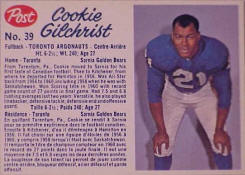 |
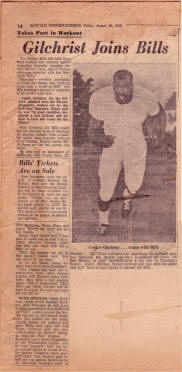 |
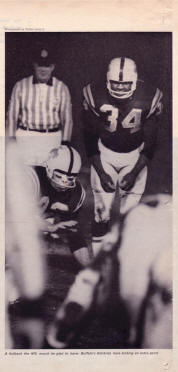 |
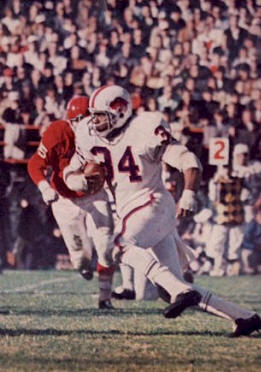 |
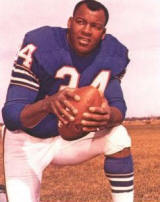 |
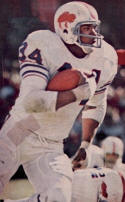 |
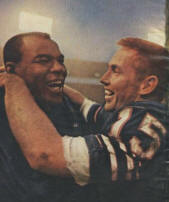 |
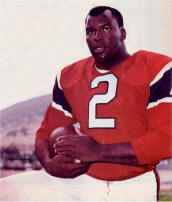 |
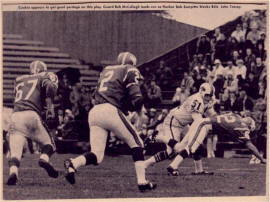 |
. |
|
Chester Carlton 'Cookie' Gilchrist
|
. |
|
Sports Editor, USA Today
letters@usatoday.com
January 10, 2011 Dear Editor: I am disappointed that you could spare little more than three lines on the death of American Football League superstar Cookie Gilchrist. When Jim Brown goes to his just reward, will you devote more than three lines to his career? The AFL was the genesis of modern Professional Football, and Gilchrist was as important to the AFL as Brown was to the NFL, if not more so. Gilchrist once held Pro Football's single-game rushing record, and was instrumental in a seminal civil rights action, the boycotting of New Orleans after racist incidents led to a change of venue for the 1965 AFL All-Star Game. These are but two of his accomplishments. Seems you could have used a bit more space to record his passing.
Sincerely,
 Angelo F. Coniglio |
|
June 25, 2011 Editor: Recently, News columnist Jerry Sullivan called for Cookie Gilchrist to be put on the Buffalo Bills Wall of Fame. Buffalo sports media, along with Ralph Wilson, seem to have forgotten that in 1971, Gilchrist was the first enshrinee in the "newly created" Buffalo Bills' Hall of Fame. This fact was reported in newspaper articles of the day. Wilson presented Cookie with a small plaque commemorating the induction, and promised that when the Bills moved to the Orchard Park stadium, a "larger, 4-foot by 8-foot plaque" would be enshrined there. This was obviously before the present "Wall of Fame" was conceived or instituted. However, Cookie had passed the requirement of being retired for three years, and was the first to be selected for the Bills' Hall of Fame. Seems to me that nothing more need be done except to put his name on the Wall, where it should have been since the stadium was built. NOTE:
A copy of a 1971 article about the induction is
shown below, entitled "Gilchrist
Enshrined in Bills' Hall of Fame".  Angelo F. Coniglio |
. |
. |
|
FINALLY!!! |
|
On August 30, 2017,
FORTY-SIX YEARS after Cookie was told he was the first member of the
'Bills Hall of Fame', the team announced that his name would go on
their Wall of Fame at the game against the Oakland Raiders on
October 29, 2017. |
. |
|
THE
BUFFALO
NEWS |
||||
Cookie Gilchrist's Wall-of-Fame honor rights
oversight
|
||||
|
Fans of the Buffalo Bills' "original glory days" can rejoice. |
|
|||
|
At
6-foot-2 and 248 pounds, Cookie was a physical freak of nature who would
have been great in any era. He was greatest at running between the
tackles. However, he had more speed to get around the corner than most
big backs -- better speed around the corner than Jerome Bettis, not as
much as Earl Campbell. And Cookie ran like "a bad man."
Why no
Cookie until now? |
||||
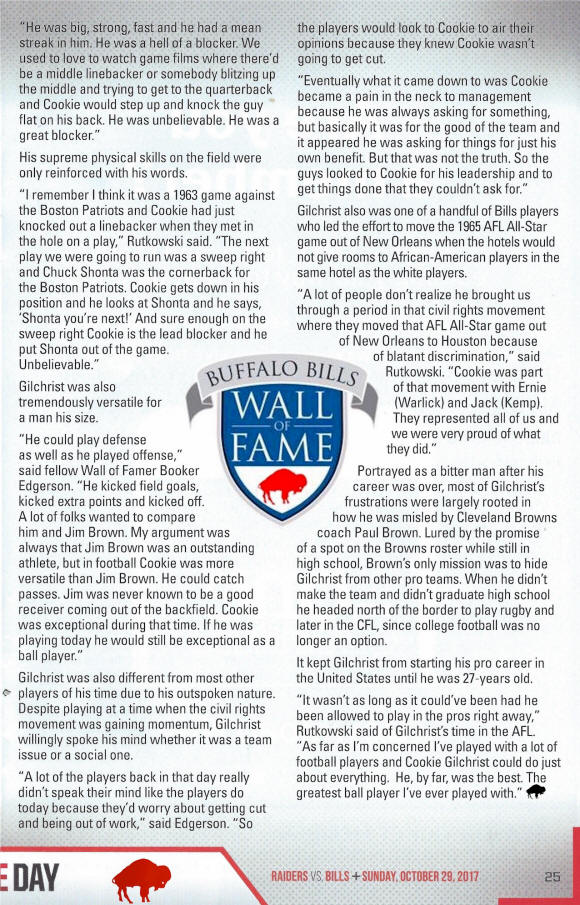 |
Please click HERE for more columns about Cookie's life.
. |
|
Click below for a slide show. |
. |
. |
| Patriots | Bills | Oilers | Jets | Dolphins | Broncos | Chiefs | Chargers | Raiders | Bengals |
